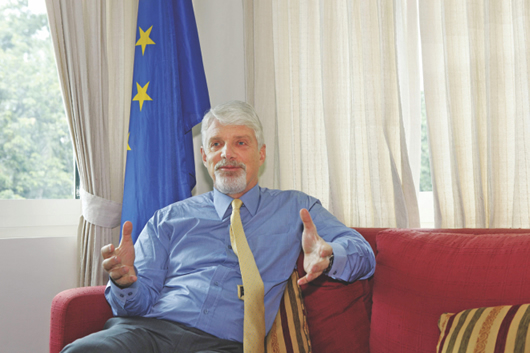
William Hanna – Head of EU in Ghana
The Sirigu Women’s Organisation for Pottery and Art (SWOPA) in the Kassena Nankana West District of Upper East Region, has been honoured with a communications award.
They received the award from the International Cooperation and Development Directorate-General of the European Commission (EU).
The success story of the SWOPA was adjudged the best among EU-supported development projects in West and Central Africa and the fourth in the World after the Business Sector Advocacy Challenge (BUSAC) Fund presented its success story to the EU, one of its development partners.
The BUSAC Fund provided support for SWOPA to advocate the extension of electricity to the association’s community, which has impacted positively on the fortunes of the organisation by increasing production and sales of handicrafts and artworks by about 40 per cent.
Mr William Hanna, EU Ambassador, who presented the awards to the SWOPA at Sirigu, said the BUSAC Fund was a project the EU supported under its 10th European Development Fund as part of the National Indicative Programme 2007-2013.
He said it main objective was to “contribute to improving the business environment through advocacy activities seen as an important condition for a sound development of the private sector in Ghana”.
“Thanks to the BUSAC Fund support you successfully managed to persuade authorities to extend electricity to the community’s arts production centre and we are glad to see how it has changed positively the business environment for your community,” Mr Hanna observed.
He said: “The importance of having light was key to maintaining productivity of business and supporting other activities including learning as indicated by many students and other residents of the Sirigu community.”
The Founder of SWOPA, Madam Melanie Kasise and the Executive Director of the Organisation, Madam Bridget Adongo expressed gratitude to the EU and the BUSAC Fund for the support.
“We provide a unique opportunity for women to come together to share and find solutions to common challenges, strengthen social ties, enhance our bargaining powers, improve on our skills in the production of quality canvass painting, basketware, pottery, and art, and in so doing improve on our incomes.”
Madam Kasise said the idea of establishing SWOPA was conceived by Madam Melanie Kasise in 1997 as a vehicle of empowering the women of Sirigu in improving the quality of handicrafts and artworks as an alternative source of livelihood to enhance their incomes, and to preserve their traditional art forms and culture.
She said several years of intensive farming and poor rainfall, degraded the land to the extent that even subsistence farming was threatened.
He called for the revival of the traditional arts of the women of Sirigu and also to leverage it as an important source of income for the women for the upkeep of their families.
Madam Adongo explained that women of Sirigu told their stories through wall decorations, canvass painting, or calabash decorations.
Source: GNA























